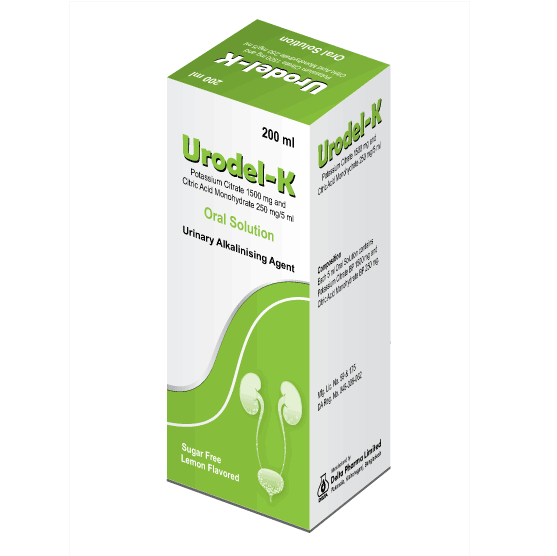Urodel-K Uses, Dosage, Side Effects and more
Potassium Citrate is absorbed and metabolized to Potassium Bicarbonate, thus acting as a systemic alkalinizer. The effects are essentially those of chlorides before absorption and those of bicarbonates subsequently. Oxidation is virtually complete so that less than 5% of the Potassium Citrate is excreted in the urine unchanged. It alkalinizes the urine without producing a systemic alkalosis in recommended dosage.

| Attribute | Details |
|---|---|
| Trade Name | Urodel-K |
| Generic | Potassium Citrate + Citric Acid |
| Weight | (1500mg+250mg)/5ml |
| Type | Oral Solution |
| Therapeutic Class | Prevention of repeated kidney stone formation, Urinary Alkalinizing Agent |
| Manufacturer | Delta Pharma Limited |
| Available Country | Bangladesh |
| Last Updated: | January 7, 2025 at 1:49 am |
Uses
This combination is used for following cases:
- To relieve discomfort in urinary tract infections due to decreased pH or acidic urine.
- In preventing kidney stone formation specially caused by uric acid with or without the presence of calcium stones.
- In gout therapy as a valuable adjuvant with uricosuric agents.
- Also effective in correcting acidosis caused by kidney disease.
Urodel-K is also used to associated treatment for these conditions: Acidosis, Catheter site calcification caused by appetite, Catheter site calcification caused by struvite, Gouty Arthritis, Headache, Heartburn, Kidney Stones, Metabolic Acidosis, Blood Specimen Collection, Blood sample storage, Bowel preparation therapy, Chemical contraception, Potassium placement, Urine alkalinization therapy, Cleansing of the colon as a preparation for colonoscopy, Oral antisepsisAcidosis, Renal Tubular, Bowel preparation therapy, Constipation, Hypocitraturic calcium oxalate nephrolithiasis, Kidney Stones, Metabolic Acidosis, Uremia, Uric Acid Nephrolithiasis, Chronic metabolic acidosis, Uric acid lithiasis, Laxative
How Urodel-K works
After oral administration of potassium citrate, its metabolism yields alkaline load. Potassium Citrate therapy appears to increase urinary citrate mainly by modifying the renal handling of citrate, rather than by increasing the filtered load of citrate. In addition to raising urinary pH and citrate, Potassium Citrate increases urinary potassium by approximately the amount contained in the medication. In some patients, Potassium Citrate causes a transient reduction in urinary calcium.
Dosage
This oral Solution should be taken diluted in water according to directions, followed by additional water, if desired. Palatability is enhanced if chilled before taking. Proper dilution may help prevent gastrointestinal injury associated with the oral ingestion of concentrated potassium salt preparations.
To relieve discomfort in UTI:
- Adults and children over 6 years: 10 ml 3 times daily, diluted with 1 glass of water.
- Children 1-6 years: 5 ml 3 times daily, diluted with ½ glass of water.
To prevent kidney stones & acidosis caused by kidney diseases:
- Adults: 10-15 ml 4 times daily (or as directed by the physician) diluted with 1 glass of water.
- Children: 5-10 ml 4 times daily (or as directed by the physician) diluted with ½ glass of water.
In gout therapy (with uricosuric agent):
- Adults: 10-15 ml 4 times daily (or as directed by the physician), diluted with 1 glass of water.
- Children: 5-10 ml 4 times daily (or as directed by the physician), diluted with ½ glass of water.
How Long Does It Take to Work?
How Long Does It Take to Work? see here Urodel-K
Side Effects
This oral solution is generally well tolerated without any side effects when given in recommended doses to patients with normal renal function and urinary output.
Toxicity
ORAL (LD50): Acute: 5040 mg/kg [Mouse]. 3000 mg/kg [Rat].
LD50 (dog): Intravenous 176 mg/kg.
Precaution
Large doses may cause hyperkalemia & alkalosis, especially in the presence of renal disease. Do not exceed recommended dosage. Discontinue use if adverse reaction occurs. Should be used with caution by patients with low urinary output unless under the supervision of a physician. As with all liquids containing a high concentration of potassium, patients should be directed to dilute adequately with water to minimize the possibility of gastrointestinal injury associated with the oral ingestion of concentrated potassium salt preparations; and preferable, to take each dose after meals to avoid saline laxative effect.
Interaction
Some products that may interact with this drug include: antacids that contain aluminum, aspirin and other salicylates (e.g., salsalate), certain blood pressure medications (e.g., ACE inhibitors such as lisinopril, angiotensin blockers such as losartan), drospirenone, eplerenone, certain heart medications (e.g., quinidine, digoxin), lithium, potassium supplements, certain "water pills" (potassium-sparing diuretics such as amiloride, spironolactone, triamterene).
Elimination Route
Urinary; less than 5% unchanged.
Pregnancy & Breastfeeding use
Combination of Potassium Citrate & Citric Acid Monohydrate should not be used during pregnancy unless the potential benefit justifies the potential risk to the fetus. It is not known if this drug is found in breast milk or not. Breast-feeding women should consult with their health care provider to confirm about taking this drug.
Contraindication
Severe renal impairment with oliguria or azotemia, untreated Addison's disease, adynamia episodica hereditaria, acute dehydration, heat cramps, anuria, severe myocardial damage, and hyperkalemia from any cause. Known hypersensitivity to any ingredient.
Special Warning
Pediatric Use: Safety and effectiveness in children have not been established.
Acute Overdose
Symptom: nausea, vomiting, abdominal pain and symptoms due to hyperkalaemia and metabolic acidosis. Fluid and electrolyte balance together with ECG should be closely monitored.
Management: Treatment is symptomatic and supportive. Moderate to severe hyperkalaemia is a medical emergency requiring prompt correction.
Storage Condition
Store in a dry place protected from light. Keep out of the reach of children.



